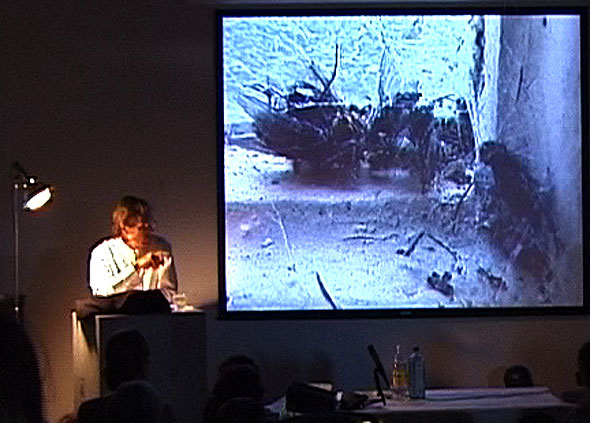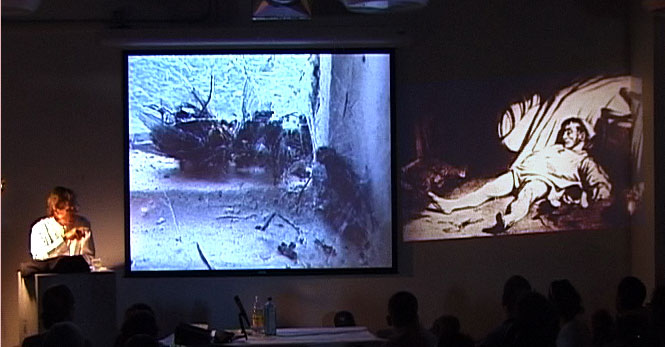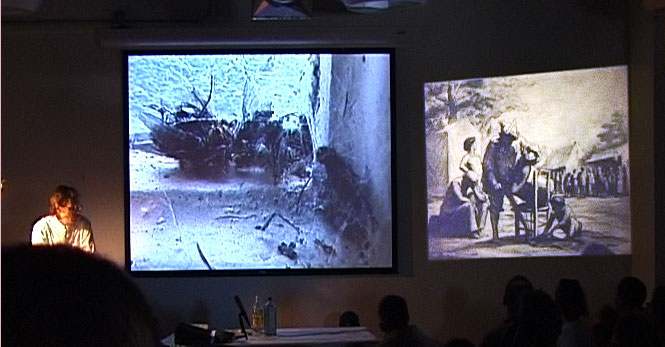|
MARK HARRIS | On
Aspects of the Avant-garde
|
Thanks
very much, Richard, and thank you all for coming. I'm sorry it's
going to be uncomfortable for many of you. I'll try to speak up,
and I'm reading something, so it should go quickly. I'm not showing
too much of my work—about four slides of my work and a video
that I made a year ago, which is just going to run, while I talk,
behind me. Because it's quite a theoretical text, I thought it
might help to have something else going on. So if you get bored
with this, you can look at that, or if that's not interesting,
you can come back to me.
I always feel very nervous about lectures,
so I really try to get myself in the right frame of mind by getting
dressed up and having a drink beforehand. It's a talk on theories
of the avant-garde, aspects of the avant-garde, with an emphasis
on intoxication. I hope that it doesn't go to my head too much.
But I'll put this video on [Flies, 2003], and maybe we
could have the lights . . .
 |
 |

Mark Harris, Flies, 2003.
 |
October,
definitely the month of iconoclasm. After Richard Roth's talk,
here is yet another one that proposes there might be something
to gain from
reconsidering
the role of the avant-garde. And in the tradition of VCU responses,
I welcome flyposting in
the school tomorrow,
but
I should
inform
you that my penis is already very small, which doesn't leave
you much opportunity for further reductions. I don't have any secure
answers, really, to the question of the avant-garde, just a few
propositions. Perhaps
you'll
be able to help me out along the way. These are really propositions
rather than assertions or statements, and any feedback would be
valuable. In a way, in a sense, this paper would be better if it
was given in a workshop situation for discussion.
Here we go.
In the background
to these thoughts also are speculations about whether what
goes
on in any
art school
really constitutes
an education, whatever we decide that ought to be. I don't want
to be misunderstood in this point, so I should clarify just one
thing. Although I have some doubts about current art school education,
I am certain
that the questioning that goes on now in most schools is more
productive than the kind of academic training I received at Edinburgh
College
of Art, where we rehearsed life drawing and life painting, still
life and landscape, four out of five weekdays. We were really
student casualties of an administrative and academic failure to
address
the implications of any twentieth-century artistic innovation,
let alone respond to the intense questioning of the value of
culture going on in Britain during the 1970s. Learning to draw
and paint
in that way is really to learn nothing.
And so to the avant-garde, the term which qualifies
much of what we understand as significant twentieth-century art
and whose legacy of innovation and questioning still informs the
remit for significant student work. I wonder what
conceptions you have of this phenomenon. You might consider for
a moment what the
term avant-garde means to you. Maybe you have some embarrassing
recollection, like a teenage crush you'd rather forget about;
as in, "Yeah, the avant-garde, wasn't it weird that
that was so important once?" Or maybe you use it in a throwaway
manner, where its meaning is just an empty shell, as in, "Hey,
this is so avant-garde." Or maybe, maybe something ambitious
with political goals in mind, as in: "By Friday, my avant-garde
work will have changed . . . the world, Richmond, whatever."
The
fact that it's easier to find a voice for the first two instances,
for
the
fading
away or empty versions, indicates how unlikely a plausible agenda
for the avant-garde has become. Its everyday usage is awkward.
We're aware, without even thinking about it, of the increasing
distance between its historical importance and its current lightweight
status, disengaged from real achievements.
I'm making a few assumptions
in this talk. They concern the avant-garde's antagonism to society
while continuing to receive its support and approval, the kind
of approach which says, "I hate you, but give me a grant,
please." This complicity with what it attacks is well known
to anyone familiar with avant-garde studies.
Because this isn't
really the time or place to go into this in much detail I'll
try to be brief. The history first.
There's no doubt that
from the start the avant-garde meant opposition, with the result
that political engagement forms the backdrop in front of which
the avant-garde has continued to perform ever since. From the
Parisian Saint-Simonists in the 1830s issues the call in the
first place for artists to form an avant-garde and propagandize
the socialist cause. This link between aesthetic and political
radicalities remains evident for the rest of that century. Without
actually calling themselves such, there are nineteenth-century
artists working oppositionally like an avant-garde. In fact,
until the 1870s the term had somewhat dilettantish connotations.
But how was their opposition expressed?

|

|

Honoré Daumier, Rue Transnonain, lithograph, 1834

|
|
How was
this opposition expressed? T. J. Clark shows how Daumier's
work [slide 1: Rue
Transnonain,
lithograph, 1834; slide 2: Saltimbanques] forms a compelling
attack on French institutions.
And here is
the work called
Murders or Massacres at Rue
Transnonain,
which was Daumier's representation
of the murders by government troops on innocent occupants of
a house that happened to be next door to a barricade. The soldiers
thought a shot had been fired at them from that house, and
they massacred
apparently all the men in the house, a lot of the other people,
too.
Or his drawings of the traveling
clowns, the Saltimbanques,
who became, in the nineteenth century, a persecuted entertainer,
and would really find it very hard to make a living. So Daumier's work
was one example.

|
 |

Honoré Daumier, Saltimbanques

|
Much
of Baudelaire's
poetry is pitched against the authorities in protest at the conditions
of the urban poor. This is most explicit in his series on wine
and in his blasphemous poems like "Litany to Satan."
Yet there are theorists like Marshall Berman who think that this
opposition of Baudelaire's went, continued right through his
life, and Berman writes on the short prose piece, "The Eyes
of the Poor," from Paris
Spleen, as an example of Baudelaire's continuing political
commitment.
Now, you might be wondering whether these
angry representations achieved anything. Did Baudelaire's poetry
change the conditions which
provoked it and, if not, then what is the point of this iconoclasm?
But I think it's important, on some level, also to be able to separate
representation from impact. Like some other art, avant-garde works
provide images of conditions which otherwise would just be regarded
as statistics. They give us a representation of what things were
like then, which may be enough.
And here's an example from the
Soviet Union. In the 1930s the son of the Russian poet Anna Akmatova
is imprisoned in a Soviet labour camp. With other prisoners' mothers
she waits outside in the winter cold in the hope, usually unfulfilled,
that she will learn something of her son's fate. Recognizing
her, another woman urges the poet to find a way to represent the
event. It's too dangerous at the time to be written down, let alone
published, so Akmatova composes the poem "Requiem" in
her head and memorizes it. And only after the conditions it
criticizes have
passed
does it become public.
The artistic
avant-garde has had very little impact on social or political structures
for this to be a justification
of its
aesthetic radicality.
And there continues to be no correspondence, really, between
aesthetic radicality and social impact, not in any measurable
form. Dadaism's extreme iconoclasm, Picasso's
Guernica, the political sloganeering of the Situationists,
the violent noise of 70s Punk Rock has no discernible impact
on political realities of the time. In fact, it would be easier
to argue the reverse
from the political conditions which followed each of these protests.
Yet these "failures" shouldn't be taken as proof
that the avant-garde never existed, nor that its actions were
futile. The economy may consume all opposition, government policy
may only
be deflected by exhaustion or the death of politicians, all cultural
protest is ignored, yet the production of antagonistic works
continues. Is it better to be producing something rather than
nothing? Well, not
according to Marcuse, whose notion of the "affirmative character
of culture" proposes that the representation of what
is bad about society alleviates that society from doing anything
about
it. The idea that if you picture something that's wrong with
society, you give the authority of that society an excuse
not to do anything about it.

|
|
|
|
On
Aspects of the Avant-garde | Table
of Images
Contributor's
Notes |